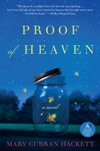To Edit or Not to Edit
By Mary Curran Hackett, Author of Proof of Heaven
While writing my first novel Proof of Heaven, I worked as an editor for a small nonprofit publisher where I had already spent the better part of eight years marking up others’  manuscripts. Given all this experience, I actually thought I knew what to expect from the editorial process when I went to publish my own book.
manuscripts. Given all this experience, I actually thought I knew what to expect from the editorial process when I went to publish my own book.
Ha!
Truthfully, I was shocked when it all went down. There wasn’t just one editor I had to answer to––there were lots of people who wanted to offer their input. Of course, my editor and publisher had insights, but before they did my agent and her assistant had their own as well, as did the other publishers who were interested in the manuscript prior to my signing with Morrow/HarperCollins. And before all of these fine people weighed in, several friends and family members read and commented on it too.
Total number of readers making suggestions, comments, and edits on Proof of Heaven: 15.
Needless to say, each reader had different perspectives and advice—and in the end it was up to me to make the final choices and decide what would stay in the book and what (or who) would go. Along the way, I received lots of contradictory and surprising advice. Instead of fighting suggestions or outright rejecting them, I waited. I went on long walks. I bit my fingernails. I sat up at night thinking.
Though there were suggestions I just couldn’t accept from preliminary readers, (e.g. converting my agnostic/former Hindu’s character to Christianity or toning down my Brooklyn firefighter character’s profanity), I did receive marvelous insights, too. I doubt my book would be on shelves today if my agent and her editor hadn’t sat on the phone with me and asked me what I really thought about the afterlife, parenting, love, and all the other things I write about in Proof of Heaven. Similarly, my amazing editor at Morrow trusted my instincts. I told her I wasn’t comfortable with the ending that I had settled on before submission and that I had another idea. She told me to go for it. And I did. Turns out, she liked it too.
So how do you know what advice to say “thanks, but no thanks” to and what advice to take? It think it comes down to these three things:
1) If you can own it, keep it. Ultimately, it is your book. Your name is on it. Write what you think is important and what you can stand behind. Some critics and readers will scoff at you or criticize you. That’s their job. Don’t write out of fear of what others will think of you. Some writers fear being too sentimental (God forbid people “feel” something while they read your work. The horror.) Some people have scoffed at me for that. Love? Really? Love is enough? Eye-roll. Sigh. Mary Curran Hackett=philistine. My response: Hey, if it was good enough for Austen, Tolstoy, Dickens, Lennon, Buddha, Jesus, Gandhi, and my mom, it’s good enough for sentimental ol’ me. Besides, it’s what I believe.
2) Be humble and gracious. Like it or not, editors do know publishing and they know their audiences (and I am not just saying that because I am an editor myself). So get over yourself and listen to them. Sit with their questions and insights. Editors aren’t asking questions to attack you, or because they think you’re stupid. They genuinely want to help you. More importantly, they want to help your potential readers understand you. If you have concerns, rationally explain them and know when to pick your battles. If you start blowing up over commas and capitalizations, chances are no one is going to want to work with you on the major changes––or ever again––for that matter. Say thank you and be kind. Editors work hard for you, and they’ll never see the royalties that you will.
3) Suck it up. Opinions are like noses, everyone’s got one and they’re not all pretty. Every reader comes to books with different expectations, hopes, standards, and yes, even baggage. You will not and can’t please everyone, but if you’re true to your story and yourself, you’ll find an audience that appreciates you (or they will find you). You’re not going to be everyone’s cup of tea. Get over it. Just keep writing from your heart (or gut, whichever you prefer to call it) about what you think, feel, believe, and perceive. You’ll only get better at it if you do. And the better you get, the less work your editors (and you) have to do.
 About Mary Curran Hackett
About Mary Curran Hackett
Mary Curran Hackett, author of Proof of Heaven, is an adjunct professor at the University of Cincinnati, freelance writer, and a book editor. She is also a wife and mother of two children, Brigid and Colm.
For more information please visit http://www.marycurranhackett.com

